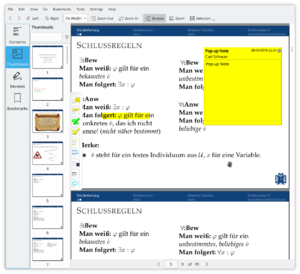Okular/it: Difference between revisions
(Updating to match new version of source page) |
(Updating to match new version of source page) |
||
| Line 13: | Line 13: | ||
Il suo sviluppo è iniziato tramite Google's Summer of Code. La descrizione del progetto è disponibile nel [http://developer.kde.org/summerofcode/okular.html KDE Developer's Corner]. | Il suo sviluppo è iniziato tramite Google's Summer of Code. La descrizione del progetto è disponibile nel [http://developer.kde.org/summerofcode/okular.html KDE Developer's Corner]. | ||
Okular | '''Okular''' combines the excellent functionalities of [[Special:myLanguage/KPDF|KPDF]] with the versatility of supporting different kinds of documents, like PDF, Postscript, DjVu, CHM, and others. | ||
La [http://okular.kde.org/formats.php pagina dei formati supportati] presenta un grafico che descrive in maggior dettaglio i formati supportati e le caratteristiche supportate per ciascuno di essi. | La [http://okular.kde.org/formats.php pagina dei formati supportati] presenta un grafico che descrive in maggior dettaglio i formati supportati e le caratteristiche supportate per ciascuno di essi. | ||
[[Image:Okular-annotations.png|thumb|300px|center| | [[Image:Okular-annotations.png|thumb|300px|center|Annotations in Okular, which can be saved within the PDF file]] | ||
| Line 25: | Line 25: | ||
Puoi comunicare con gli sviluppatori e gli altri utenti su IRC, irc.freenode.org, canale [irc://irc.kde.org/#okular #okular]. | Puoi comunicare con gli sviluppatori e gli altri utenti su IRC, irc.freenode.org, canale [irc://irc.kde.org/#okular #okular]. | ||
If you are interested in contributing to '''Okular''', please [http://okular.kde.org/contact.php contact the team]. Programmers and non-coders are welcome all the same. | |||
| Line 40: | Line 40: | ||
How to keep the annotations you made to the PDF file: | How to keep the annotations you made to the PDF file: | ||
By default, Okular saves annotations in the local data directory for each user. Since KDE 4.9, it's optionally possible to store them directly in a PDF file by choosing | By default, '''Okular''' saves annotations in the local data directory for each user. Since KDE 4.9, it's optionally possible to store them directly in a PDF file by choosing <menuchoice>File -> Save As...</menuchoice>, so they can be seen in other PDF viewers. | ||
Note that this feature requires Poppler 0.20 or newer for regular PDF documents. If the PDF document you are annotating is encrypted, this feature requires Poppler 0.22 or newer. | Note that this feature requires Poppler 0.20 or newer for regular PDF documents. If the PDF document you are annotating is encrypted, this feature requires Poppler 0.22 or newer. | ||
[[Category:Grafica/it]] | [[Category:Grafica/it]] | ||
Revision as of 16:40, 21 July 2018
Cos'è Okular?
 |
Okular è un visualizzatore universale di documenti per KDE SC 4.x |
Puoi seguire lo sviluppo sulla pagina principale del progetto.
Informazioni
Il suo sviluppo è iniziato tramite Google's Summer of Code. La descrizione del progetto è disponibile nel KDE Developer's Corner.
Okular combines the excellent functionalities of KPDF with the versatility of supporting different kinds of documents, like PDF, Postscript, DjVu, CHM, and others.
La pagina dei formati supportati presenta un grafico che descrive in maggior dettaglio i formati supportati e le caratteristiche supportate per ciascuno di essi.

Oltre a supportare molti formati, Okular offre funzionalità come la selezione del testo, la creazione di annotazioni, l'estrazione dei file integrati all'interno di un documento e tante altre sorprese. Schermate di Okular in azione sono visibili qui.
Puoi comunicare con gli sviluppatori e gli altri utenti su IRC, irc.freenode.org, canale #okular.
If you are interested in contributing to Okular, please contact the team. Programmers and non-coders are welcome all the same.
Consigli e suggerimenti
Stampa
In questa discussione sul forum un utente ha dichiarato che Okular non poteva stampare i PDF. Il problema è stato identificato in un file ~/.cups/lpoptions corrotto. Rinominandolo Okular l'ha ricreato e dopo questo l'utente non ha avuto più problemi nello stampare i PDF.
Reviewing Documents / Annotations
Facendo doppio clic su uno degli strumenti di Revisione (F6) è possibile creare annotazioni multiple senza dover riattivare lo strumento dopo la prima volta.
How to keep the annotations you made to the PDF file:
By default, Okular saves annotations in the local data directory for each user. Since KDE 4.9, it's optionally possible to store them directly in a PDF file by choosing , so they can be seen in other PDF viewers. Note that this feature requires Poppler 0.20 or newer for regular PDF documents. If the PDF document you are annotating is encrypted, this feature requires Poppler 0.22 or newer.
